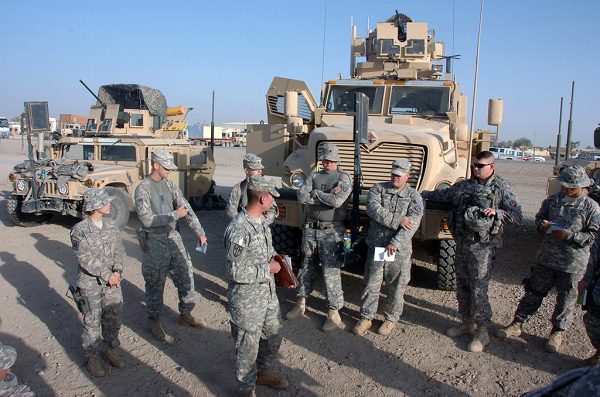If you are contemplating a career in the military, you might need a list of National Guard Pros and Cons.
Many join the National Guard to serve their country and their state.
However, others see it as an opportunity to build leadership potential, receive an education, or to develop job-related skills.
The National Guard has many incentives that make it an attractive option for many who are weighing out their options and planning the next stages of their lives.
The best decisions are ones that weigh the National Guard’s pros and cons before signing up for service.
Related Article – Miltary Reserves: Details on all 5 Branches of the Reserves
National Guard vs. Active Duty

If you are an active duty member, you are in the military full time.
Also, you likely live on a military base, or close to one.
Furthermore, you know a deployment to a different base anywhere in the world is possible without much notice.
If you become a member of the National Guard, you are not full-time active duty.
You also face deployment, but you do not live on a military base.
However, despite not living on base, you live within driving distance of one.
The National Guard consists of the Army National Guard and the Air National Guard.
The National Guard is federally funded but controlled by the state unless the federal government deploys your unit.
Key National Guard Benefits
Those who serve in the National Guard do so part-time. However, the compensation is fair for hours spent in training or deployed.
Those in the National Guard train close to home and maintain a civilian life, all while reaping the many benefits of military life.
Some benefits include the following:
- Job Training
- Leadership Development
- Education Benefits
- Social Support and Networking
- Meaningful Service to Community
Related Article – How To Become A Pilot In The Air National Guard
5 Pros of Joining the National Guard

Let us consider the benefits in depth.
Job Training
One of the many benefits of the National Guard is paid job training.
When you first sign up for the National Guard, you will take the ASVAB test.
This test is an aptitude test that measures your strengths and weaknesses in specific fields.
If you score well enough in certain fields, you might consider a job in that area.
Some fields include police and protection, technology, and even engineering, just to name a few.
Also, the skills you learn in the National Guard transfer from the military to a civilian career.
This transfer of skills gives you a step up because you have hands-on experience that others may not have.
Leadership Development
The National Guard works with members to build leadership development strategies that reflect the goals of the service member and their unit.
The Guard will provide you with professional development and an increase in responsibilities in your career.
Because of this increased level of responsibility, your leadership skills sharpen.
You will learn how to work under pressure in the National Guard, and you will develop your critical thinking skills.
In the civilian world, you will find you have the edge over the competition due to the professional and leadership development you gain in the National Guard.
Currently, many corporations struggle to find qualified individuals to fill leadership positions. Companies look in-depth at potential candidates to determine their potential to be leaders.
As a member of the National Guard, you are already a leader.
Related Article – Does the National Guard Pay For College?
Education Benefits

The National Guard has several educational programs to help members.
Some members take advantage of the available scholarships or spouse education support.
Also, there are generous programs that help pay for all your tuition.
GI Bill
The GI Bill is a benefit that benefits those who sign up for a six-year commitment.
Members receive a direct payment each month while in school.
Federal and State Tuition Assistance
The Federal and State Tuition Assistance Program gives financial assistance to service members who are pursuing an education in their personal time.
The Federal program gives members monthly payments to pay for college credits.
Also, the State program is a little different.
Each state funds its own program; therefore, each state is a little different.
In many cases, you can stack state and federal programs together to receive a tuition-free education.
Social Support and Networking
Service members often refer to their unit as a second family.
It is the building of these relationships that provide you with support and friendship.
Also, this level of social support lends itself to networking opportunities, as well.
Also, when you serve in the National Guard, you meet a lot of people.
These contacts help you when you are looking for new opportunities in the civilian world.
Also, those who are veterans continue to enjoy the social support and networking opportunities that are available.
Related Article – How To Switch From Reserves To Active Duty
Meaningful Service to Community
The National Guard serves both the individual state as well as the nation.
Your local National Guard unit is composed of individuals in the community.
Therefore, there is a sense of pride for not just serving the country, but by being a valued member of the community and surrounding areas.
Primarily, the National Guard supports the states during times of natural disasters or unrest, so you do not just serve your country; you serve your immediate community.
If you are a member of your community’s National Guard unit, you are an essential member of the public because your skills and leadership meet the needs of your community.
5 Cons of Joining the National Guard
For every pro, there is a con.
When making life-changing decisions, it is vital to explore potential negative consequences.
By knowing the whole story, you are best able to make an informed decision that makes sense for your path in life.
Risk of War-Time Deployment
The National Guard is a part-time commitment, but there is the potential of deployment.
Often the National Guard responds during times of natural disasters such as earthquakes and hurricanes.
However, some deployments may take you overseas, and you may find yourself exposed to hostile fire and other dangerous conditions.
Also, these deployments take you away from the balance of your civilian personal and work life while you focus on the military.
Complex Work and Life Balance
Balancing work and life is a challenging task for many people.
However, if you are in the National Guard, you face another challenge with your scheduling.
Those in the National Guard attend training one weekend a month and two weeks out of the year.
This obligation leaves you to work around your training weekends when you want to schedule your downtime with family or friends.
Part-Time Work and Long Commitment
While many may view the part-time status as a pro for joining the National Guard, others do not agree.
The part-time status can complicate life for scheduling and finding a balance in life, and the pay may seem low at first, although it grows over time.
The typical enlistment time is eight years, although you could serve as little as three years due to the ability of some to switch to Individual Ready Reserve (IRR).
Therefore, this is a long commitment for part-time work.
Slower Promotions
The National Guard tends not to promote its members quickly compared to active duty.
The slower promotions are due to the size and structure of the National Guard.
Simply, the National Guard does not need as many people to be promoted compared to their active-duty counterparts.
Therefore, service members who make it on the promotion list are selected depending on vacancies in your area.
Training Time and Proficiency
The National Guard training is of high quality and is continuous and ongoing.
However, many believe that despite ongoing training, the training is not enough to allow a service member to reach a high level of proficiency in their field.
Related Article – 3 Steps for Visiting an Army Recruiter Near You
Conclusion
Decision-making often comes down to looking at National Guard pros and cons and making a decision that works for you.
First, you will evaluate your personal goals.
After deciding if the National Guard is the best fit for you compared to active duty, it is time to look at the details.
Some pros for the National Guard are the training and leadership possibilities.
Also, many consider the opportunity to receive a free or nearly free degree a positive.
However, a balanced decision includes evaluating the cons.
Some argue the National Guard does not have enough training to give a service member the highest level of proficiency.
Others note the difficulty in finding a balance between civilian work and personal life already complicated enough before adding drill weekends into the schedule.
In the end, the best decision is one you make that reflects your personal goals and plans for your future.
Resources:
www.nationalguard.com/education-programs
www.nationalguard.com/benefits
- Ikon Pass Military Discount: Learn How To Save Big - January 31, 2025
- RTIC Military Discount: Find Out How To Save Big on Gear - January 30, 2025
- Traeger Military Discount: Learn How To Save Big on Smokers - January 28, 2025


